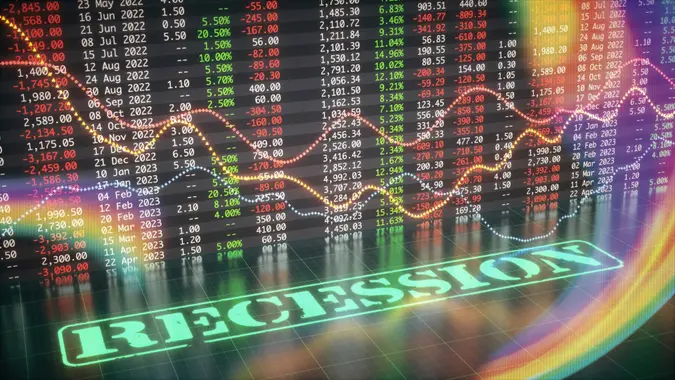40% of Americans Expect a Recession, New Poll Finds; Do Experts Agree?

Commitment to Our Readers
GOBankingRates' editorial team is committed to bringing you unbiased reviews and information. We use data-driven methodologies to evaluate financial products and services - our reviews and ratings are not influenced by advertisers. You can read more about our editorial guidelines and our products and services review methodology.

20 Years
Helping You Live Richer

Reviewed
by Experts

Trusted by
Millions of Readers
Though economists for the most part concur that we aren’t in a recession yet, many Americans think we’re heading toward one.
According to a new poll by GOBankingRates, 40% of respondents think the economy will sink into a recession in 2023. Thirty-one percent think the economy will recover slowly this year, 12% think it will remain status quo and just 5% think it will bounce back quickly.
What do finance experts think? Do they foresee a recession? If so, when will it arrive and how long will it take the nation to recover from it?
A Mild Recession Is Likely in the Works
“Based on the current data, it looks like we will see a mild recession in Q2 or Q3 of this year,” said Josh Hile, CFA, CPA, CEO and CIO of Citizen Mint. “What this means is businesses looking to slightly reduce their workforce to adjust to slowing or even contracting growth from the economy. It looks like it will be mild based on current unemployment of 3.7%, job openings above 10 million that need to be filled — specifically many within the service sector, as well as healthcare and manufacturing sectors. Consumers all continue to be healthy from a balance sheet perspective with household debt service ratios at 9.8%.”
But it is difficult to predict precisely what a recession will look like and what exactly it will do, largely because the economic environment is constantly changing, said Nate Nead, CEO at Invest.net. That said, there are some telltale signs of trouble and pain associated with any recession.
“Firstly, unemployment will likely rise sharply due to businesses reducing their operations or closing altogether as a result of reduced consumer demand and/or government-mandated lockdowns,” Nead said. “This will likely lead to increased personal debt and a decrease in household income, which could further exacerbate the issue.”
“Small businesses may also be disproportionately affected as they have often been unable to access the same relief measures or capital as larger companies. This could result in an increase in bankruptcies and job losses in this sector.”
Neal continued, “Government stimulus measures and other efforts are underway to try and soften the landing for businesses and individuals, but there is a limit to how much can be done. Ultimately, it will be up to each person to take the necessary steps to protect themselves financially during this time.
“Overall, this recession could look different than those in the past due to its unprecedented nature,” Nead said. “It is important to stay informed so that you can make educated decisions about how best to protect yourself and your family. Doing this will ensure that you don’t get caught off guard by any unexpected twists or turns ahead.”
How Will the Recession End?
When will the recession end? This is the toughest question to answer. But before we get to that we must consider how a recession ends. It ends, largely, with the government.
“Government policies will play a key role in helping to stimulate the economy,” Nead said. “Policies such as tax cuts, government spending, interest rate reductions and loan guarantees can all help to encourage economic activity and spur recovery. Consumers also play a role in determining the shape of the recovery as their spending habits drive demand for goods and services, which in turn helps create jobs.”
When Will the Recession End?
“It is difficult to predict exactly how long it will take for the economy to recover from a recession,” Nead said. “In general, recessions tend to last around eight to 18 months, but some may be shorter or longer, depending on the severity of the economic downturn and the policies that are put in place by governments and central banks.
“The speed of the recovery also depends on consumer spending, the dynamism of the private sector and other factors,” Nead continued. “What is certain is that it will take time for the economy to fully recover from this recession.”
 Written by
Written by  Edited by
Edited by 

























